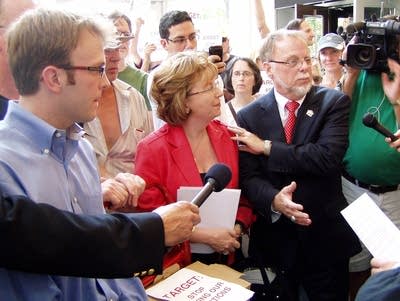Some fear a new push against same-sex marriage will come with a backlash
Go Deeper.
Create an account or log in to save stories.
Like this?
Thanks for liking this story! We have added it to a list of your favorite stories.

A committee in the Minnesota Senate will hold a hearing Friday on a proposal to amend the state's constitution to ban same-sex marriage.
Republican sponsors say the proposal to define marriage in the constitution as between a man and a woman will protect the sanctity of marriage. They've been trying since 2004 to put a same sex-marriage ban on the ballot and have their best chance of doing so this year, now that they control the Legislature.
But some opponents of the idea are using a key GOP talking point against it: They say it will hurt the state's economy.
"With Minnesota competing or talent in other states and countries, a same-sex marriage ban would put the state at a competitive disadvantage," said Ann Kaner-Roth, executive director of Project 515. The group works to ensure that same-sex couples and their families have equal rights and considerations under Minnesota law.
Turn Up Your Support
MPR News helps you turn down the noise and build shared understanding. Turn up your support for this public resource and keep trusted journalism accessible to all.
Roth said many Minnesota companies already provide domestic partner benefits to their employees. She hopes to convince them to get more involved in the marriage issue.
"The corporate community has seen the value of creating an inclusive culture, and we hope that they'll bring that message to the Legislature," Roth said. "The public has been very clear in saying that they want to see the Legislature focus on jobs and the economy, and that is the key focus right now."
The state's business groups are staying on the sidelines for now. A spokesman for the Minnesota Business Partnership said same-sex marriage is not an issue that his organization has taken a position on or identified as a priority.
Minnesota Chamber of Commerce lobbyist Tom Hesse said his organization hasn't identified gay marriage as an issue. He said though that he does expect it to provoke some discussions as chamber members consider how the amendment would affect them.
"Those are some of the decisions we haven't made yet or haven't discussed yet," Hesse said. "I think it's kind of a work in progress."
Same-sex marriage has put companies in Minnesota and across the country in the spotlight. Target Corporation was heavily criticized for contributing $150,000 to a political fund that supported Republican nominee Tom Emmer in last year's race for governor. Emmer supported efforts to ban same-sex marriage.
Target's CEO apologized for the contribution and said the company would review its political giving as a result.
An Atlanta law firm hired by House Republicans in Washington to defend the federal Defense of Marriage Act reisgned the case, in part because several corporate clients, including Coca-Cola, expressed concerns about it. The Justice Department has decided not to defend the act, which bars the federal government from accepting same-sex marriages recognized by state law.
There is one Minnesota CEO who is speaking out against the amendment. Charlie Zelle, who owns Jefferson Bus Lines and is chairman of the Minneapolis Regional Chamber of Commerce, said he's concerned it will make it more difficult to attract customers and workers to Minnesota.
"The idea of focusing on the economy and focusing on productive efforts is really paramount," Zelle said. "This is a distraction and it's also probably for customers and employees alike something nobody would really like to see.
"I really don't see the nexus or the link between the two arguments."
State Sen. Warren Limmer, R-Maple Grove, said he doubts a gay marriage ban would have any impact on the state's economy. Limmer, chief author of the amendment, said Minnesota already has a law banning same-sex marriage -- known as the Defense of Marriage Act.
"If a business owners or a corporate interest seems to have a problem, why haven't they come forward before," Zimmer asked?
If the House and Senate pass the proposed constitutional amendment, voters in next year's election would decide the issue. Unlike other bills the governor cannot veto a constitutional amendment.



